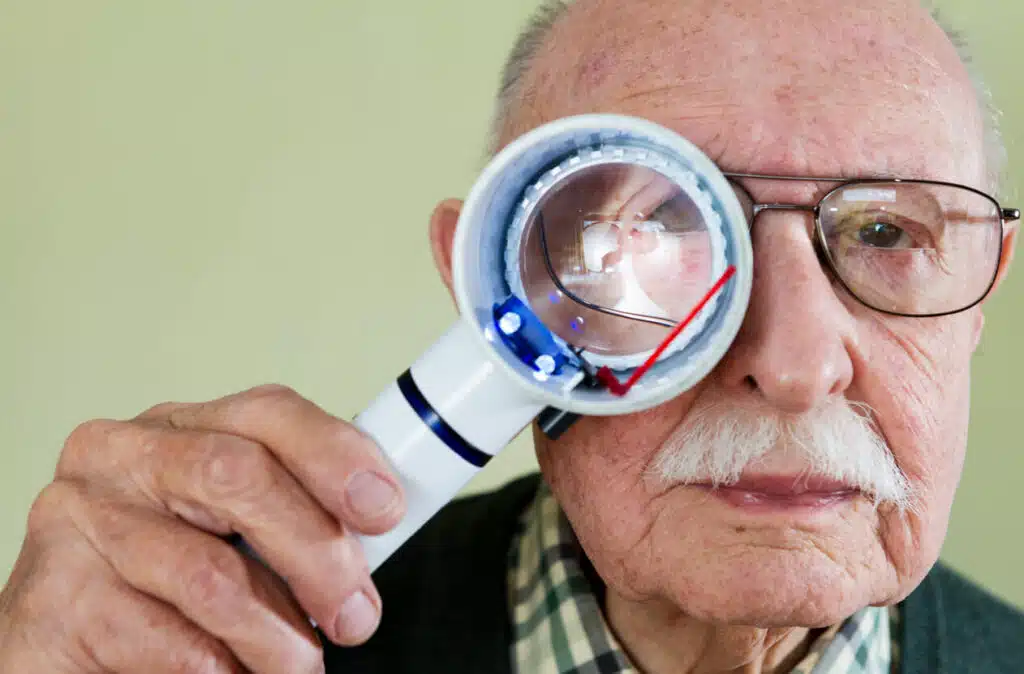
Macular degeneration is one of the leading causes of blindness worldwide, and diabetic patients are at a higher risk of developing this condition. This condition occurs when the small central portion of the retina, called the macula, deteriorates, leading to vision loss.
Diabetic patients are at risk due to elevated glucose levels that can damage blood vessels in the eye. Fortunately, there are several treatment options available that can slow progression and manage the symptoms of macular degeneration in diabetic patients.
Let’s explore macular degeneration, the link between diabetes and macular degeneration, and how macular degeneration can be treated.
What Is Macular Degeneration?
Macular degeneration is a medical condition that affects the part of the eye called the macula, located in the center of the retina (the back layer of the eye). This area is responsible for our sharp, central vision, which we need for reading, driving, and recognizing faces.
In macular degeneration, this area starts to deteriorate or break down, causing blurriness or a blind spot in the center of your vision. There are two types: “dry” (more common and less severe) and “wet” (less common but more serious, with new, abnormal blood vessels growing under the retina).
Macular degeneration is often linked to aging; hence it’s also known as age-related macular degeneration (AMD). It’s also one of the leading causes of vision loss in older adults.
Links Between Macular Degeneration and Diabetes
Both conditions affect the microvascular system, which can lead to complications in the eyes. While AMD affects the center of the retina, known as the macula, diabetes can cause damage to the blood vessels in the retina, leading to diabetic retinopathy.
Some studies suggest that people with diabetic retinopathy might be more likely to develop AMD, though more research is needed to fully understand this link.
Treatment of Macular Degeneration
Although there is currently no cure for macular degeneration, several treatment options can slow the progression of the disease and alleviate symptoms.
Lifestyle Changes
Lifestyle changes play a crucial role in managing both diabetes and AMD. Regular exercise, maintaining a balanced diet, and quitting smoking can help control blood sugar levels and support overall eye health.
Protecting your eyes from excessive sunlight and getting regular eye exams are also important preventive measures.
Nutritional Supplements
For dry macular degeneration, nutritional supplements play a significant role in treatment. Vitamins C and E, lutein, zinc, copper, and zeaxanthin have been found to be beneficial. These supplements can help slow the progression of the disease, reducing the risk of it advancing to a more severe stage.
Medications
Wet macular degeneration treatments often involve medications such as aflibercept, ranibizumab, bevacizumab, and brolucizumab.
These medications are injected into the eye to stop the growth of abnormal blood vessels. They work by blocking a specific growth factor, thereby inhibiting the development of new, unwanted blood vessels and preventing further leakage and bleeding in the eye.
Photodynamic Therapy (PDT) and Laser Therapy
Photodynamic therapy is another treatment option for wet macular degeneration. In this procedure, a light-sensitive drug is injected into the bloodstream, which gets absorbed by the abnormal blood vessels in the eye.
A laser is then shone into the eye to activate the drug, damaging the abnormal blood vessels without causing significant harm to the surrounding tissues.
Laser photocoagulation is a less commonly used treatment option where a high-energy laser beam is directed at the abnormal blood vessels to seal them off and prevent further leakage and bleeding.
Laser therapy can also treat diabetic retinopathy in patients with diabetes.
Regular Eye Examinations
Regular eye examinations are critical in managing macular degeneration. They allow for early detection of the disease, making treatments more effective. If you’re over 50 or have a family history of macular degeneration, regular check-ups with an ophthalmologist are highly recommended.
Macular Degeneration Diabetes Treatment Near Me in Washington, MO
Managing macular degeneration in diabetic patients requires a comprehensive approach that includes medical treatments, lifestyle modifications, and regular eye care.
If you are diabetic and are having vision problems, visit us here at Advanced Sight Center in Washington for comprehensive assessment and treatment. We have a team of highly trained and skilled ophthalmologists and optometrists who use state-of-the-art technology to effectively treat a wide range of eye diseases, including diabetic retinopathy, glaucoma, macular degeneration, and corneal disorders.
To know more about us or to set up a one-on-one consultation with one of our ophthalmologists, don’t hesitate to call us at (636) 239-1650 or fill out our online appointment request form. We look forward to serving you!



